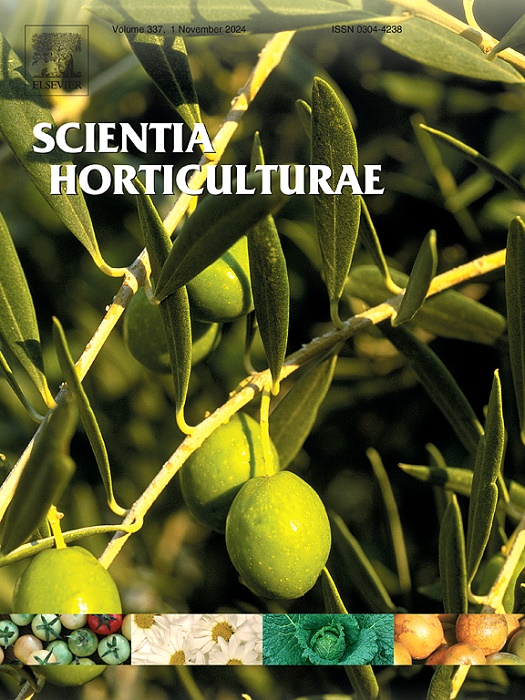壳聚糖纳米配方迷迭香精油可减轻盐分对生菜的生理生化损害
IF 4.2
2区 农林科学
Q1 HORTICULTURE
引用次数: 0
摘要
盐度是一种主要的非生物胁迫,会损害植物生长并限制农业生产力。本研究探讨了迷迭香精油壳聚糖纳米颗粒(reocsnp)缓解盐胁迫对生菜生长的影响。试验在温室内进行,采用完全随机设计,重复3次。莴苣植株暴露在不同的盐度水平下,并用reocsnp、壳聚糖纳米颗粒或迷迭香精油处理。盐度胁迫显著降低了根和茎的生物量、叶绿素含量以及氮、磷和钾的吸收,同时增加了丙二醛(MDA)和过氧化氢(h2o2)等氧化标志物的水平。相反,叶面施用reocsnp,特别是在500 ppm时,能有效改善植物的生长和生理状态。该处理增加了养分积累、渗透保护剂(脯氨酸和可溶性碳水化合物)和次生代谢物(酚类物质和类黄酮),显著提高了超氧化物歧化酶(SOD)、过氧化氢酶(CAT)和过氧化物酶(POX)等抗氧化酶的活性。此外,它还降低了MDA和H₂O₂水平,表明氧化损伤减轻。总之,这些发现强调了reocsnp作为盐环境中可持续生物刺激剂的潜力,并为未来基于纳米生物技术的策略研究铺平了道路,以提高作物在非生物胁迫条件下的抗逆性。本文章由计算机程序翻译,如有差异,请以英文原文为准。
Nanoformulated rosemary essential oil in chitosan matrix alleviates salinity-induced physiological and biochemical damages in lettuce
Salinity is a major abiotic stress that impairs plant growth and limits agricultural productivity. This study investigated the potential of rosemary essential oil-loaded chitosan nanoparticles (REO![]() CSNPs) to alleviate the detrimental effects of salt stress in lettuce (Lactuca sativa L.). The experiment was conducted in a greenhouse using a completely randomized design with three replications. Lettuce plants were exposed to varying salinity levels and treated with REO
CSNPs) to alleviate the detrimental effects of salt stress in lettuce (Lactuca sativa L.). The experiment was conducted in a greenhouse using a completely randomized design with three replications. Lettuce plants were exposed to varying salinity levels and treated with REO![]() CSNPs, chitosan nanoparticles, or rosemary essential oil. Salinity stress significantly reduced root and shoot biomass, chlorophyll content, and uptake of nitrogen, phosphorus, and potassium, while increasing levels of oxidative markers such as malondialdehyde (MDA) and hydrogen peroxide (H₂O₂). In contrast, foliar application of REO
CSNPs, chitosan nanoparticles, or rosemary essential oil. Salinity stress significantly reduced root and shoot biomass, chlorophyll content, and uptake of nitrogen, phosphorus, and potassium, while increasing levels of oxidative markers such as malondialdehyde (MDA) and hydrogen peroxide (H₂O₂). In contrast, foliar application of REO![]() CSNPs, particularly at 500 ppm, effectively improved plant growth and physiological status. This treatment enhanced nutrient accumulation, osmoprotectants (proline and soluble carbohydrates), and secondary metabolites (phenolics and flavonoids), and it significantly boosted the activities of antioxidant enzymes including superoxide dismutase (SOD), catalase (CAT), and peroxidase (POX). Moreover, it reduced MDA and H₂O₂ levels, indicating decreased oxidative damage. In summary, these findings underscore the potential of REO
CSNPs, particularly at 500 ppm, effectively improved plant growth and physiological status. This treatment enhanced nutrient accumulation, osmoprotectants (proline and soluble carbohydrates), and secondary metabolites (phenolics and flavonoids), and it significantly boosted the activities of antioxidant enzymes including superoxide dismutase (SOD), catalase (CAT), and peroxidase (POX). Moreover, it reduced MDA and H₂O₂ levels, indicating decreased oxidative damage. In summary, these findings underscore the potential of REO![]() CSNPs as a sustainable biostimulant in saline environments and pave the way for future research into nanobiotechnology-based strategies to enhance crop resilience under abiotic stress conditions.
CSNPs as a sustainable biostimulant in saline environments and pave the way for future research into nanobiotechnology-based strategies to enhance crop resilience under abiotic stress conditions.
求助全文
通过发布文献求助,成功后即可免费获取论文全文。
去求助
来源期刊

Scientia Horticulturae
农林科学-园艺
CiteScore
8.60
自引率
4.70%
发文量
796
审稿时长
47 days
期刊介绍:
Scientia Horticulturae is an international journal publishing research related to horticultural crops. Articles in the journal deal with open or protected production of vegetables, fruits, edible fungi and ornamentals under temperate, subtropical and tropical conditions. Papers in related areas (biochemistry, micropropagation, soil science, plant breeding, plant physiology, phytopathology, etc.) are considered, if they contain information of direct significance to horticulture. Papers on the technical aspects of horticulture (engineering, crop processing, storage, transport etc.) are accepted for publication only if they relate directly to the living product. In the case of plantation crops, those yielding a product that may be used fresh (e.g. tropical vegetables, citrus, bananas, and other fruits) will be considered, while those papers describing the processing of the product (e.g. rubber, tobacco, and quinine) will not. The scope of the journal includes all horticultural crops but does not include speciality crops such as, medicinal crops or forestry crops, such as bamboo. Basic molecular studies without any direct application in horticulture will not be considered for this journal.
 求助内容:
求助内容: 应助结果提醒方式:
应助结果提醒方式:


